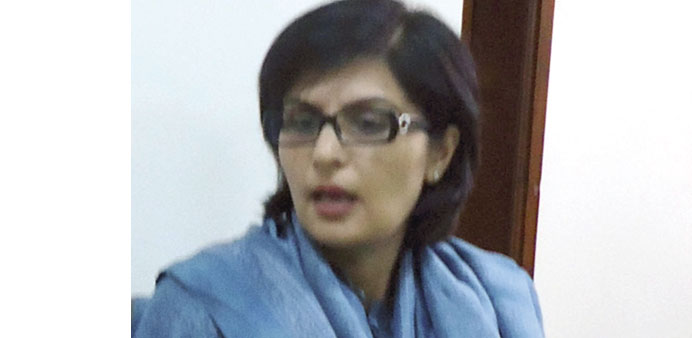Minister Nishtar said more time was needed to implement e-voting.
By Salman Siddiqui/Staff Reporter
As preparations for May 11 general elections in Pakistan go into overdrive, the option of e-voting for overseas Pakistanis in Qatar and elsewhere in the world has all but been ruled out as an “impossible” task.
Pakistan’s senior federal minister in the caretaker government, Dr Sania Nishtar, who was in Doha recently, told the Gulf Times in an interview that the arrangements needed for such an exercise are beyond their capacity given the short time available.
However, keeping in mind the Supreme Court of Pakistan’s clear directives to the Election Commission of Pakistan and the government for making all arrangements to ensure voting of overseas Pakistanis, she hinted that another option may be made public soon, indicating that overseas Pakistanis in Qatar might still have a chance to cast their vote.
The minister explained that when the Chief Justice of Pakistan issued an order to ensure overseas Pakistanis get to vote, different arms of the government moved to implement the directives.
“I have the ministry of information technology portfolio as well in the caretaker government, and I’m supposed to exercise policy oversight in this area. I have analysed this area carefully and in great depth,” she said.
The minister said that there are four requirements for e-voting: first, a legislative requirement, which was not a problem, since the law was in place.
Second, the development of a software, which the Pakistan court ordered the National Database and Registration Authority to make, which it did.
The third requirement, which turned out to be the main impediment, was the logistics that included procurement and installation of the hardware in embassies abroad, software installation and security checks, human resource training, and an information campaign designed for overseas Pakistanis so that they are aware of the new system.
Also, on the diplomatic front, embassies needed to obtain permissions from their host countries to conduct the elections as well as guidelines on how polling booths will be handled during the exercise.
“The foreign office selected nine countries and wrote to them to seek permissions for installing e-voting systems in those countries,” Nishtar said.
However, during the course of carrying out the exercise, it was discovered that the task was too huge to be carried out.
“They were quite a few of us (in the caretaker government) who were going again and again to the Election Commission, where we all took stock of the situation, and we decided that it would be best to tell the Supreme Court that it would not be possible for us to pull this off in the given time.
“Because if we did a half-baked thing, either the equipment will not reach (the polling station) on time or if, e.g., outside the embassy there was a congregation of 5,000 and the booths were not capable of serving them, then a ‘situation’ could arise,” she said.
However, she said overseas Pakistanis will be accommodated through another system.
“We will still have a manual process available and that information will be made public very soon. But as far as e-voting is concerned, if we had a year or 18 months, and we were to intensively work with our missions abroad, then we may have been able to pull off something. It is just not possible to do it within two weeks,” the minister said.
Nishtar said that “something like a postal ballot system or some other thing” may be made available to the overseas Pakistanis.
About her objectives in Pakistan’s caretaker setup, she said “the main objective is to ensure that elections are held free and fair”.
“All of us are very committed to that and in our domains, like in my ministry, the interfaces with e-voting and a number of different areas where technology has to come into place … I have to have an oversight on that,” she said.
Nishtar’s ministry also played a key role in the degree verification process of political candidates.
She said that although she was here for a short time, she hoped to start reforms.
“I’m a policy person, I’m also conceptualising an agenda of reform, which I will articulate in a handwritten note to my successor,” the minister said.
About her plans after completing her assignment with the caretaker government, she said: “I have my hands full. This is a short term assignment. It is a service to the country and I was happy to take out two months. But I have plenty to go back to.”
Nishtar was in Doha to participate in the “Educate a Child” initiative of wife of HH the Emir HH Sheikha Moza bint Nasser.
She was appointed federal minister in the caretaker cabinet of Pakistan government on April 2. Her portfolios are science and technology, information technology, and professional education and training.
Nishtar is a cardiologist who later went on to establish Heartfile, an NGO. She is the author of six books, including Choked Pipes that was published by Oxford University Press.
She is also the recipient of Pakistan’s presidential award Sitara-e-Imtiaz, the European Societies Population Science Award, the Global Innovation award, and many accolades of the International Biographical Centre, Cambridge and the American Biographical Center.
She holds a fellowship of the Royal College of Physicians and has a Ph.D from Kings College, London.

